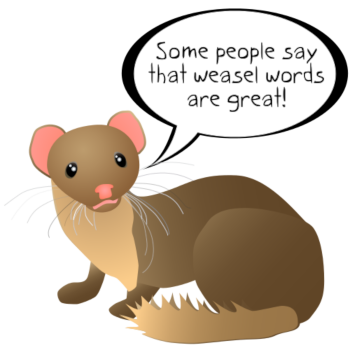What are some examples of weasel words?
You’ve probably done it. I mean … You HAVE done it.
You’ve used weasel words in your writing.
I have, too. (I did it just now, in the first sentence of this article.)
A weasel word, or anonymous authority, is an informal term for words and phrases aimed at creating an impression that something specific and meaningful has been said, when in fact only a vague or ambiguous claim has been communicated.
An example of this is using terms like “probably” or “somewhat”, which make a sentence more ambiguous than it would be without them.
The bad thing about weasel worded statements is that their implication is misleading or too vague to substantiate. Even if an author intended to buttress an argument with an estimate of support, weasel words dilute meaning or make sentences open to multiple interpretations.
Whether you’re writing technical papers, articles for content marketing or ad copy you’re already fighting an uphill battle to be viewed as trustworthy. So why sow suspicion in your prospect’s mind right off the bat?
While you may not be using weasel words to be evasive, weasel words and phrases weaken your language and can set off alarm bells in buyers’ heads.
A 2009 study of weasel words on Wikipedia found that most weasel words could be divided into three main categories:
- Numerically vague expressions (for example, “some people”, “experts”, “many”, “evidence suggests”)
- Use of the passive voice to avoid specifying an authority (for example, “it is said”)
- Adverbs that weaken (for example, “often”, “probably”)
Other forms of weasel words include these:
- Non sequitur (Latin for “it does not follow”) statements are a pattern of reasoning rendered invalid by a flaw in their logical structure that can neatly be expressed in a standard logic system.
- Use of vague or ambiguous euphemisms
- Use of grammatical devices such as qualifiers and the subjunctive mood
- Glittering or vague generalizations
Because we like to write our own informative blog posts, after reading an article, “3 shell scripts to improve your writing”, I was inspired to create this tool. Although, at first I thought I would like to write a C++ version of this tool, JavaScript is well suited to this particular type of application.
For me, writing software is much easier, more interesting and fun than writing articles for digital marketing. Thank you Matt for inspiring me to create this tool and helping to make writing meaningful articles more enjoyable by thinking about the article writing process from the perspective of a programmer.
Weasel words are not guaranteed to be slated for removal, it depends on the context. Making them stand out does enable you to determine more easily, if they should be removed or replaced with more meaningful words.
If a statement is true without weasel words, remove them. If they are needed for the statement to be true, consider removing the statement. If there is a genuine opinion, make the preface more specific. Who are these people? When, where, and why did they say that? What kind of bias might they have? How many is “some”?
Write meaningful, truthful, and substantive words with precision and clarity. Your readers will thank you by continuing to read what you write.
Tool to Highlight Weasel Words in Your Writing
Replace the text below with your own text to automatically highlight known weasel words:
Up next: this tool will be improved with functions to check for “passive voice”, and “lexical illusions” as well.



